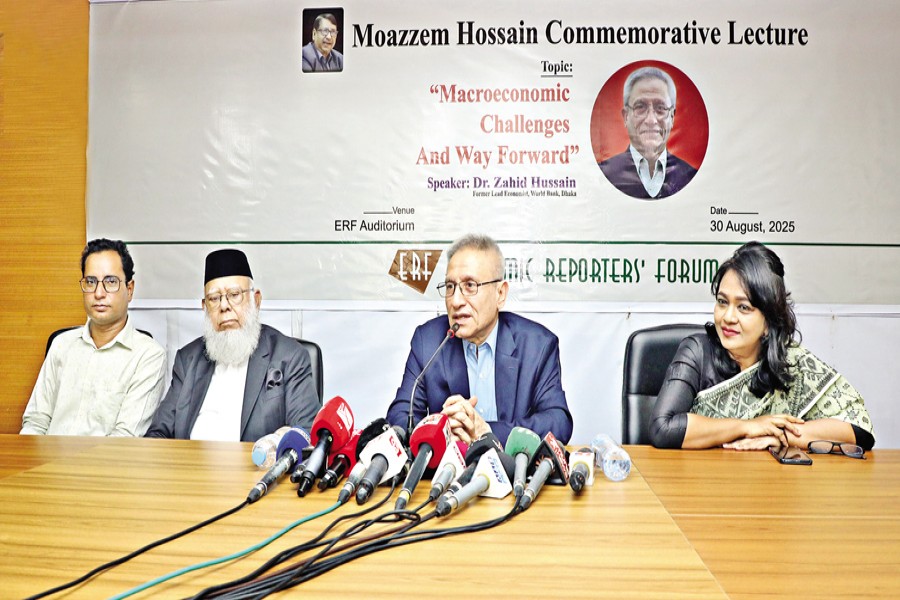
Published :
Updated :

Higher tariffs imposed on India and China by the Trump administration could divert US$1.27-2.32 billion in US export orders from these countries to Bangladesh in the current fiscal year (FY) 2025-26, says Dr Zahid Hussain, former lead economist at the World Bank's Dhaka office.
"A 30-percent higher tariff on India alone could divert $1.2-2.07 billion in orders to Bangladesh, while those from China could range from $74 million to $250 million," he said on Saturday while speaking at a discussion titled "Moazzem Hossain Commemorative Lecture," organised by the Economic Reporters' Forum (ERF) in memory of its founding president, late Moazzem Hossain, who was also the founding editor of The Financial Express (FE).
Dr Hussain noted that economic activity has increased compared to last year and overall stability has improved, but household conditions have worsened, with poverty and inequality on the rise.
"Stability has largely been restored through the removal of those involved in money laundering and plundering, the appointment of competent people to key management positions, and favourable global factors, including declines in the US dollar, commodity prices, exchange rates, and interest rates," he said.
Mahbubur Rahman, chairman of International Publications Limited (IPL), the parent company of the FE, addressed the event at the ERF auditorium, which was presided over by ERF President Doulot Akter Mala.
Highlighting Moazzem Hossain's tireless efforts in establishing the FE and his skill in building it as a credible economic newspaper, Mr Rahman said, "All investors and journalists had confidence in Moazzem Hossain."
He added that Moazzem Hossain lived up to that trust, turning The Financial Express into a reliable outlet for economic news while also making it a profitable institution.
Mahbubur Rahman, who is also president of the International Chamber of Commerce Bangladesh (ICC,B), praised Hossain's exceptional capacity in economic journalism and his ethical standards, noting that the newspaper continues to uphold these principles even after his passing.
He emphasised that the FE has never indulged in "yellow journalism," reporting solely on facts and issues -- including misuse of official power, violations of central bank rules, and mismanagement in private sector boards -- without taking sides for or against any industrial group.
"The mismanagement stems from those running the government. Without their complicity, no single individual -- or even five or 10 people -- could have undermined the entire system," he said.
While delivering a speech on "Macroeconomic Challenges and the Way Forward," Dr Hussain said economic activity in Bangladesh has picked up, and overall stability has improved compared to FY23.
However, he cautioned that conditions at the household level have worsened, with rising poverty and inequality.
He also noted that the true condition of banks has yet to improve, as defaulted loans continue to mount despite the cessation of large-scale looting in the sector.
Addressing the role of policy, Dr Hussain says it has not played a major part in the country's current economic stability. "There has been a shift in economic management, with greater discipline in policymaking. But this does not mean all government decisions are correct."
Despite some positive signs, he warned that Bangladesh remains trapped in the middle-income bracket. "Key obstacles include the ongoing power and energy crisis, a stressed banking sector, and weaknesses in the logistics system, underdeveloped labour markets, and institutional decay," he said.
"Trump administration had imposed higher duties on Bangladeshi products than on Indian goods, prompting international media reports that up to 22 per cent of Bangladesh's $6.5 billion exports to the US might shift to India.
"With India now facing tariffs 30 per cent higher, the situation has reversed," he noted.
India's exports to the US totalled $82 billion last year, of which around 65 per cent fall under the Trump tariffs, he said.
Highlighting the reform efforts of the interim government, Dr Hussain stressed that political will is necessary to ensure reform; however, it alone is not enough. Effective reform requires strong implementation capacity, which calls for coordinated action among the Council of Advisers, the administration, the business community, and civil society.
"Without collaboration among these four groups, reforms are likely to stall," he said.
Commenting on the current Council of Advisers, he described them as "sincere and courageous in some areas, yet helpless or lacking direction in others."
The ERF held the first lecture in memory of late Moazzem Hossain in 2022, attended by Dr Mashiur Rahman, former adviser to the prime minister.
Last year, Dr Debapriya Bhattacharya, distinguished fellow at the Centre for Policy Dialogue (CPD), delivered the second such lecture. Abul Kashem, general secretary of ERF, moderated the third lecture.
jahid.rn@gmail.com


 For all latest news, follow The Financial Express Google News channel.
For all latest news, follow The Financial Express Google News channel.